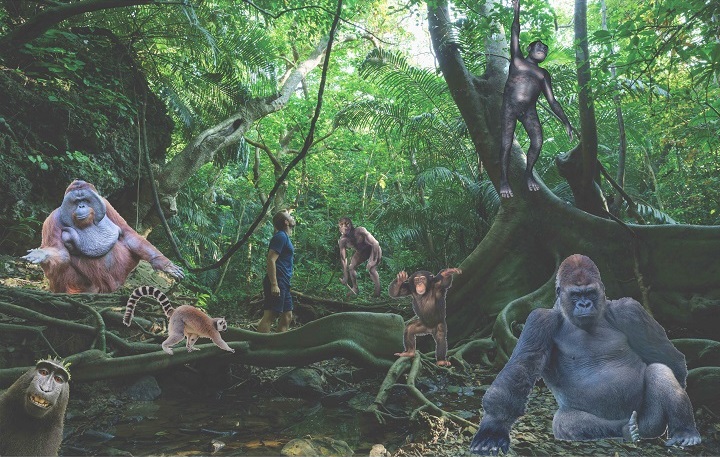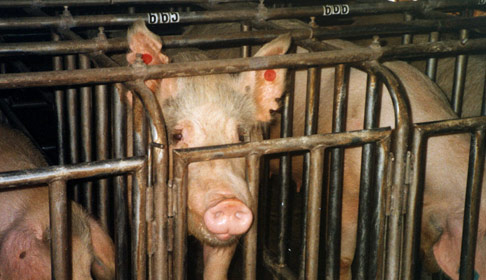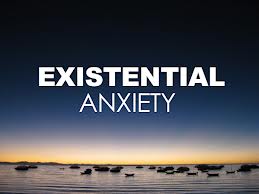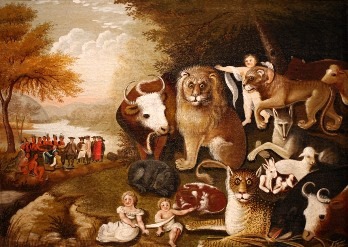Guest post by Michael Mountain
(A new paper by Dr. Lori Marino and Michael Mountain explores the psychology behind why we humans continue to reduce the other animals to the status of resources, commodities and property – even at risk of driving much of life on Earth to extinction.)
I thought it couldn’t be that difficult. After all, it had worked with homeless pets. In less than 20 years, the number of dogs and cats being killed in shelters in the United States had dropped from more than 17 million a year to around three million.
Surely something similar, with an approach that appealed to people’s better nature and didn’t slam them with guilt and shame could make a difference for all the other kinds of animals, too.
But within three or four years of leaving my work as president and one of the founders of Best Friends Animal Society, it was clear that what had worked for homeless pets wasn’t the rule; it was the exception to the rule.
In every other sphere of animal protection, the situation is getting worse, not better.In every other sphere of animal protection – from factory farming to vivisection to wildlife to entertainment – the situation was getting worse all the time, not better. The thousands, of animal rights and welfare organizations, large and small, professional and grassroots, were barely making a dent in the situation.
And for every dent they did make, like attempts to get some of the factory farms to provide a few extra inches of space in cages where the animals spend their entire lives, the destruction and abuse would just balloon out in another direction. From 1950 to 2013, the number of animals slaughtered in factory farms in the United States alone ballooned from 100 million to more than nine billion. And, like a nuclear plant in meltdown, those same factory farms generate chemical poisons and waste that contaminate land and water for hundreds of miles around.
Meanwhile, almost half the birds that once flew across North America have vanished. Most of the great iconic species in Africa – elephants, lions, rhinos, giraffes, many more – will all be gone in about 25 years. There are almost no fish left in the oceans. Sea birds come home to their families with bellies full of plastic waste. We’ve created a way of living that’s destroying our home and bringing on a mass extinction that will most likely consume us, too.
The “what you can do to help” messages that worked so well in the no-kill movement simply don’t apply in the wider world. Sure, you can carpool, ride a bike, go vegan, join a march, save water, whatever. But even the device you’re likely reading this post on (and the one I’m writing it on) is just adding to the problem, powered by lithium that involves more destruction to the homes of the animals we think we’re helping to protect.
And while, yes, the situation is better for homeless pets, that doesn’t mean it’s better overall for dogs and cats. Most of them still come from factory farms – puppy mills that churn out “pure” breeds so genetically deformed their lives are a painful misery. These designer dogs still make up most of the pets in this country.
Why are we doing this? Why have we created a way of living that’s destroying the only home we have and bringing on a mass extinction that will most likely consume us, too? And all in the name of “progress.” Why can’t we stop?
The Denial of Death
 Those are the questions Dr. Lori Marino and I set out to answer in a paper that will be published in March in the journal Anthrozoos, but is already fast-tracked online here. (You need a subscription to Anthrozoos to access the full text.)
Those are the questions Dr. Lori Marino and I set out to answer in a paper that will be published in March in the journal Anthrozoos, but is already fast-tracked online here. (You need a subscription to Anthrozoos to access the full text.)
The paper, entitled “Denial of Death and the Relationship between Humans and Other Animals”, explores the psychology of how and why we humans feel compelled to treat our fellow animals as commodities and resources – and the whole natural world as our property.
The reason lies at the core of the human condition. It’s probably best summed up by the French author Albert Camus, who wrote:
“Humans are the only creatures who don’t want to be what they are.”
And what we absolutely don’t want to be is an animal.
Our central problem, as humans, is that as much as we reach for the stars and create profoundly beautiful works of art, we cannot escape the knowledge that, just like all the other animals, we are destined to die, go into the ground, and become food for worms.
In his Pulitzer Prize-winning book The Denial of Death, social anthropologist Ernest Becker wrote that the awareness we humans have of our personal mortality creates a level of anxiety that drives much of our behavior. Certainly other animals experience bursts of terror in the face of death, but for us humans it’s a lifelong awareness, and one that brings about a chronic level of anxiety.
 And so, to alleviate the anxiety we feel over our animal nature, we try to separate ourselves from our fellow animals and to exert control over the natural world. We tell ourselves that we’re superior to them and that they exist for our benefit. We treat them as commodities and resources, use them as biomedical “models” or “systems” in research, and force them to perform for our entertainment.
And so, to alleviate the anxiety we feel over our animal nature, we try to separate ourselves from our fellow animals and to exert control over the natural world. We tell ourselves that we’re superior to them and that they exist for our benefit. We treat them as commodities and resources, use them as biomedical “models” or “systems” in research, and force them to perform for our entertainment.
We even enshrine this abuse in our most sacred belief systems. (The Catholic Catechism, for example, states that “Animals, like plants and inanimate beings, are by nature destined for the common good of past, present, and future humanity.”)
To the extent that companion animals fare better, this is largely because we’ve come to treat them as part of our human “in-group” and relate to them a bit like children.
Our belief systems also offer us hope in some form of immortality that’s not accorded the other animals. These and other ways of distancing ourselves from the rest of nature are so embedded in our cultures that they’re typically not even questioned, much less stopped.
But, as in all forms of denial, we cannot escape what we are. And the more we try to bend nature to our will, the more we end up harming the planet and all its living creatures, quite possibly beyond repair.
The more we try to bend nature to our will, the more we end up harming the planet and all its living creatures.Becker’s theory about the denial of death has given rise to a field of psychology known as Terror Management Theory (TMT) – how we humans try to manage our terror of death. TMT has produced some fascinating studies demonstrating that when people are reminded of their mortality, even unconsciously, they have more negative attitudes toward animals.
Denial of death comes in many flavors, and Becker is not the only person who’s written about it. Stephen Cave’s book Immortality: The Quest to Live Forever and How It Drives Civilization explores four major ways we humans attempt to deny our mortality:
- life extension through medical and scientific developments
- bodily resurrection as promised by many religions
- survival of the soul, a non-physical aspect of ourselves
- leaving a legacy, like fame or fortune, to ensure that our name will live on, or raising children with the aim of living on through them.
Whether or not any of these approaches or belief systems may actually work, none of them has successfully relieved our existential anxiety. Underlying them all is our fundamental need to demonstrate to ourselves that we’re not animals, which drives our need to control the other animals.
But telling ourselves that we’re not animals does not make it so. And the more we try to “subdue” the Earth, take “dominion” over the other animals, and bend nature to our will, the worse the situation becomes, to the point where, in denying our own nature, we’ve ended up causing destruction to the planet and all its living creatures, possibly beyond repair.
What to Do
There’s no simple answer to turning this around, any more than there’s a simple answer to how to bring an end to war or poverty or any other evil of the human condition.
But, as any psychologist can tell you, the first step toward stopping compulsive, destructive behavior is to understand what’s causing it. At least then we have the ability to see ourselves more clearly.
And for those of us working to relieve the suffering of the billions of animals caught up in this nightmare, an awareness of the psychological issues behind human behavior can at least give us some perspective on why this work can be so frustrating.
Albert Einstein wrote:
 A human being is a part of the whole called by us universe, a part limited in time and space. He experiences himself, his thoughts and feeling as something separated from the rest, a kind of optical delusion of his consciousness. This delusion is a kind of prison for us, restricting us to our personal desires and to affection for a few persons nearest to us.
A human being is a part of the whole called by us universe, a part limited in time and space. He experiences himself, his thoughts and feeling as something separated from the rest, a kind of optical delusion of his consciousness. This delusion is a kind of prison for us, restricting us to our personal desires and to affection for a few persons nearest to us.
Our task must be to free ourselves from this prison by widening our circle of compassion to embrace all living creatures and the whole of nature in its beauty.
Any of us can begin to do this, individually or together. And when we reach out to make our peace with our fellow animals, not only does this make an immediate difference for them; it also helps us to feel connected once again to nature, and so to our own true nature.
That’s because when we feel connected to nature, we’re connected to life. And that in itself provides relief from our debilitating anxiety about death.
Michael Mountain is a member of the board of The Kimmela Center for Animal Advocacy and the former president of Best Friends Animal Society. Michael assists in the work of several animal protection organizations and writes a blog at www.earthintransition.org.







